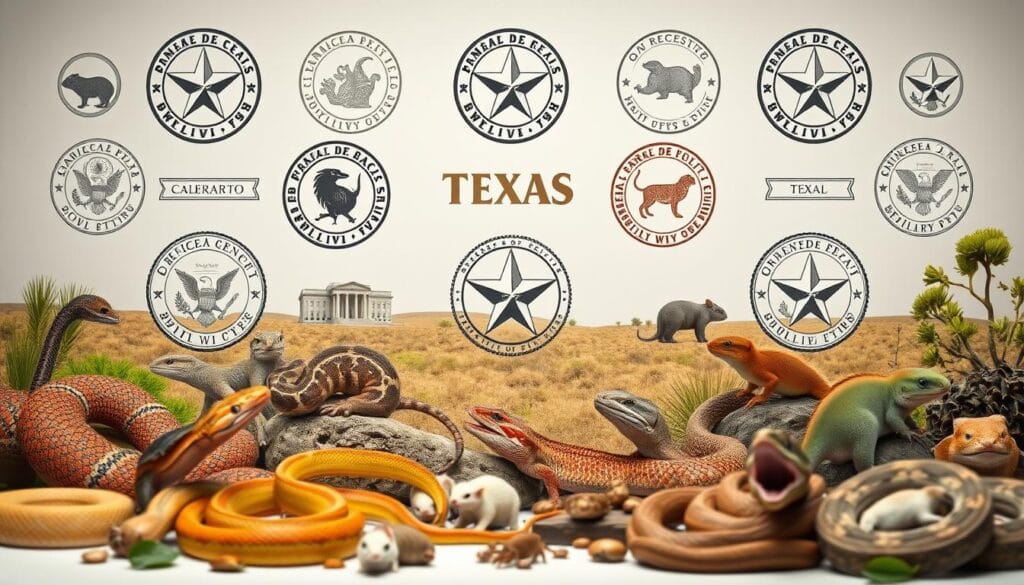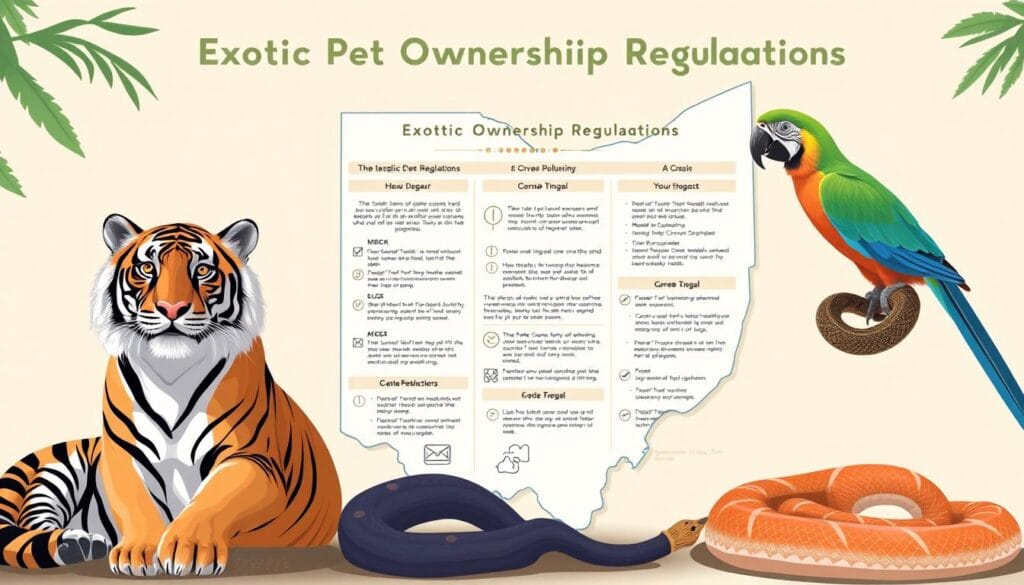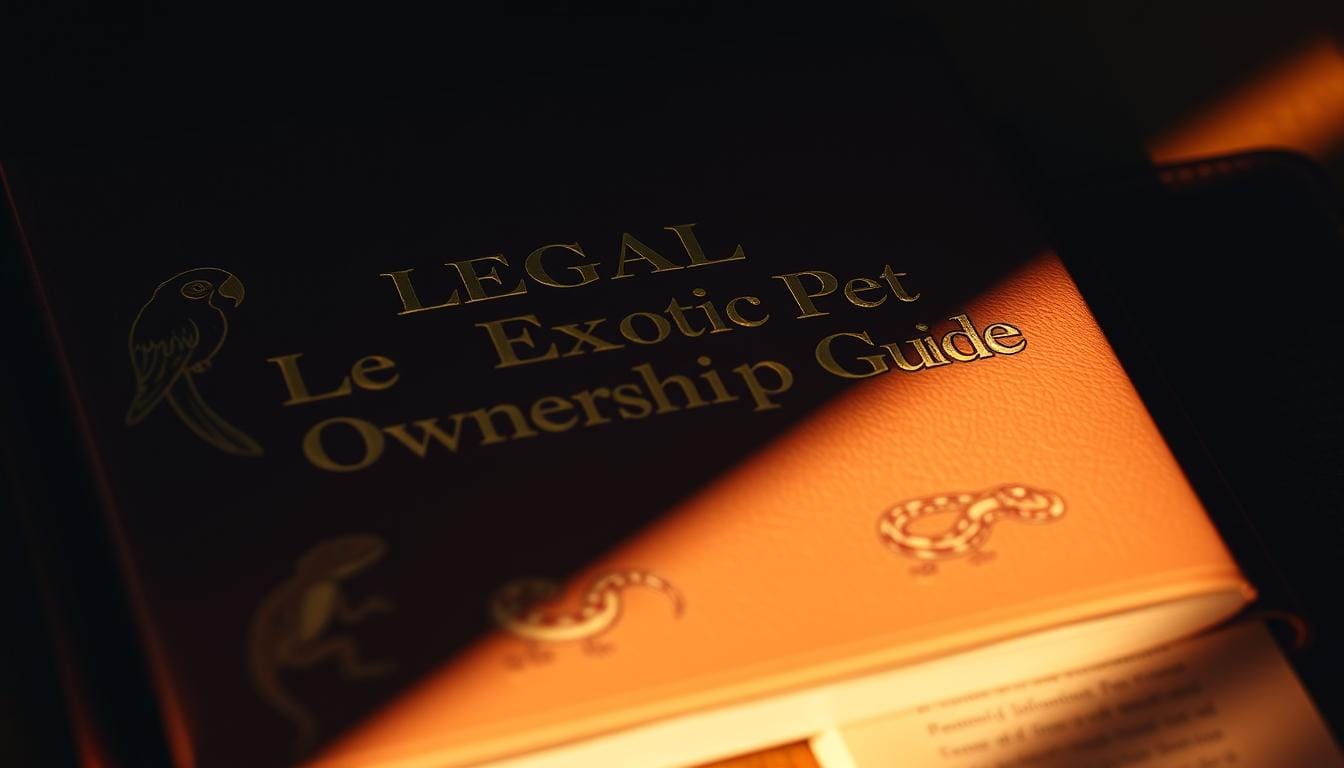Ever dreamed of having a pet that’s not like any other? The world of exotic pets is both exciting and complex. To own an exotic pet, you need to understand the laws in your state.
Choosing an exotic pet is more than just picking an unusual animal. It’s about knowing the Legal exotic pets by state, ethical, and practical sides of caring for a non-traditional pet. Each state has its own rules, so it’s important to know what’s allowed in your area.
Exotic pet laws change from state to state. What’s legal in one place might be banned in another. This guide will help you explore the world of exotic pets while following the law.
Table of Contents
Understanding Exotic Pets: Definitions and Examples
Exotic animal laws have changed how we keep pets in the U.S. Many people now keep unusual animals as pets. This might surprise you.
An exotic pet is any animal that’s not a common pet. These animals offer a special kind of friendship to their owners.
Defining Exotic Pets
Exotic pets include many different animals. Here are a few examples:
- Reptiles like bearded dragons and ball pythons
- Small mammals including hedgehogs and sugar gliders
- Unusual birds like African Grey parrots
- Invertebrates such as Madagascar hissing cockroaches
Why Choose an Exotic Pet?
“Exotic pets offer a unique connection to the animal kingdom that traditional pets cannot match.” – Wildlife Expert
There are many reasons to choose an exotic pet. Here are a few:
- They look unique and interesting
- They need special care
- They offer a rare kind of friendship
- Some people just love unusual animals
Common Exotic Pets Across the U.S.
Some exotic pets are more popular than others. It’s important to know the laws before getting one.
| Exotic Pet | Average Lifespan | Specialized Care Needs |
|---|---|---|
| Bearded Dragon | 10-15 years | Temperature control (75-85°F) |
| African Grey Parrot | 40-60 years | 4 hours daily social interaction |
| Sugar Glider | 12-15 years | Specialized diet and habitat |
Remember, owning an exotic pet means a lot of research and dedication. You must understand their special needs.
Federal Laws Regarding Exotic Pet Ownership
Understanding federal laws about exotic pets is key. The U.S. has laws to protect wildlife and keep people safe. These laws are important for owning exotic animals.
Federal laws help control where you can have exotic pets. Two main laws are key in this area:
The Lacey Act: Protecting Ecosystems
The Lacey Act is a big deal for wildlife. It stops the illegal trade of wildlife, fish, and plants. For those with exotic pets, this means:
- Strict rules on bringing in exotic species
- Big penalties for breaking wildlife laws
- Keeping native areas safe from invasive species
Endangered Species Act: Preserving Vulnerable Wildlife
This law affects exotic pet rules in big ways. It does this by:
- Stopping people from having endangered species without a permit
- Keeping threatened animals safe from being used for money
- Setting rules for saving wildlife
Federal Permit Requirements
Getting a federal permit for exotic pets is tough. You must show you can:
- Provide the right home and care
- Understand what the pet needs
- Follow safety and conservation rules
Remember to check the latest federal laws. Laws about wildlife can change and differ based on the exotic pet you want.
State-Specific Regulations: General Overview
Exotic pet rules vary a lot from state to state. It’s important to know your local laws to own an exotic pet legally and responsibly.
State rules for exotic pets can be tough to follow. Each state has its own way of handling exotic animal ownership. This means what’s okay in one state might be banned in another.
Importance of Knowing Your State’s Laws
Learning about local exotic pet rules helps you avoid legal trouble. You should think about:
- Specific species restrictions
- Permit requirements
- Potential fines for not following the rules
- Local laws that might differ
How State Regulations Vary
Exotic pet rules can change a lot. For example:
- Oregon needs a State Department of Agriculture permit for exotic animals
- Pennsylvania has rules for certain exotic wildlife with specific permits
- Some states ban certain exotic pets altogether
Resources for State Law Updates
To keep up with banned exotic pets and changing rules, check:
- State wildlife departments
- Local agricultural offices
- Professional exotic pet associations
- Online legal databases
Always check the latest rules before getting an exotic pet. This helps avoid legal problems.
Legal Exotic Pets in California
California is very strict about owning exotic pets. It’s important to know the laws well. The state has rules that make it hard to have unusual pets.
Many exotic pets are banned in California. This makes it tough for animal lovers. You need to check the permits and local rules before getting a non-traditional pet.
Prohibited Exotic Pets in California
- Ferrets
- Hedgehogs
- Monkeys
- Squirrels
- Gerbils
Dangerous and Restricted Species
The California Department of Fish and Wildlife (CDFW) has a list of banned pets. Dangerous animals strictly prohibited include:
- Lions
- Tigers
- Bears
- Crocodiles
- Chimpanzees
- Raccoons
Legal Consequences and Penalties
| Violation Type | Potential Consequences |
|---|---|
| Illegal Pet Ownership | Up to 6 months in jail |
| Fines | $500 to $10,000 |
| Restricted Species Permit | Initial cost over $450, annual renewal nearly $400 |
“California’s exotic pet laws reflect a commitment to protecting native wildlife and ecosystems.”
Even though it’s rare, owning banned pets can lead to big legal and financial problems. Always do your homework and talk to local wildlife experts before getting an exotic pet in California.
Legal Exotic Pets in Florida
Florida is a top spot for those who love exotic pets. It has more relaxed laws than many states. Knowing the rules for owning exotic pets is key to being a responsible owner in Florida.
Exploring Florida’s Exotic Pet Landscape
The Florida Fish and Wildlife Conservation Commission (FWC) groups exotic pets into three categories. Each has its own set of rules:
- Class I Wildlife: 24 highly restricted species including chimpanzees and tigers
- Class II Wildlife: 38 species needing special permits like howler monkeys and alligators
- Class III Wildlife: The rest with fewer rules
Unique Florida Exotic Pet Laws
Florida’s laws for exotic pets are detailed. Most Class I wildlife can only be kept if you got them before August 1, 1980. For Class II animals, you must follow specific rules in Florida Statutes sections 379.3761 and 379.3762.
Permitting Process and Resources
When you want to own an exotic pet in Florida, remember these important steps:
- Get the right permits from the FWC
- Make sure your pet has permanent ID
- Keep detailed records for a year
- Report what happens to your pet within 30 days
Remember: Following the laws for exotic pets is vital to avoid fines or legal trouble.
Popular pets in Florida include corn snakes, sugar gliders, and some reptiles. Always check the care needs and local laws before getting an exotic pet.
Legal Exotic Pets in Texas

Texas is a great place for those who love exotic pets. But, there are specific laws to follow. It’s important to know the rules if you want an unusual pet.
The state has clear rules about which pets are okay and which aren’t. Some animals need special permits, while others are not allowed at all.
Texas Exotic Pet Regulations
Before getting an exotic pet in Texas, you need to know a few things:
- Hedgehogs and chinchillas are legal with the right permits
- Ferrets don’t need special rules
- Some exotic deer like axis and fallow deer are okay
- Venomous snakes need a Controlled Exotic Snake Permit
Popular Exotic Pets in Texas
Here are some interesting exotic pets you can have in Texas:
- Aoudad sheep
- Blackbuck antelope
- Elk
- Sika deer
Local Jurisdictions and Rules
State laws are a starting point, but local areas might have their own rules. Always check with your specific county or city regulations before acquiring an exotic pet.
The 2022 Big Cat Public Safety Act changed things. It made owning big cats like tigers and lions illegal without special permits. So, it’s key to stay up to date with the latest laws.
Legal Exotic Pets in New York
Finding out about exotic animal rules in New York can be tough. The state has strict rules about which pets are allowed. This makes it hard for people who want unique animals as pets.
New York is very strict about owning exotic pets. The state law says most wild animals can’t be pets. But, there are a few exceptions.
Permitted Exotic Pets in New York
Even with strict rules, some exotic animals are okay to keep in New York. Here are some examples:
- Certain camelids (llamas, alpacas)
- Select small mammals
- Non-venomous reptiles
- Specific bird species
New York City vs. State Regulations
New York City has even stricter rules than the rest of the state. People living in the city face extra hurdles when thinking about exotic pets.
Licensing and Health Requirements
Getting an exotic pet in New York means dealing with a lot of rules. Here’s what you need to do:
- Get a Certificate of Veterinary Inspection
- Show that the animal is healthy
- Get the right permits
- Show you can take good care of the animal
It’s important to know these rules to be a responsible pet owner in New York. Always check with local officials and vets before getting an exotic pet.
Legal Exotic Pets in Illinois
Understanding the rules for owning exotic pets in Illinois is key. The state has laws about owning these animals. It’s important to know these laws before getting an unusual pet.
Illinois has strict rules for owning exotic pets. These rules help keep everyone safe and protect animals.
Understanding Exotic Animal Restrictions
The state’s Dangerous Animals Act sets rules for owning exotic pets. Some key rules include:
- Prohibition of dangerous predators like lions, tigers, and wolves
- Special registration requirements for certain exotic species
- Strict penalties for not following the rules
Registered Exotic Pets Allowed in Illinois
Even though many exotic animals are banned, some can be owned with the right permits. Exotic pet restrictions by location in Illinois allow some species under certain conditions.
| Exotic Pet Category | Ownership Status | Special Requirements |
|---|---|---|
| Capuchin Monkeys | Limited Approval | Mobility-impaired individuals only |
| Small Reptiles | Permitted | Maximum 4 per species, 8 total |
| Wolf-Dog Hybrids | Prohibited | Considered dangerous |
Compliance and Legal Consequences
“Knowing the law is your first step to responsible exotic pet ownership.” – Illinois Wildlife Regulations
Breaking the rules for exotic pets can lead to serious problems. Possible penalties include:
- Class C misdemeanor charges
- Animal seizure
- Substantial financial penalties
- Potential legal prosecution
Before getting an exotic pet in Illinois, do your homework. Talk to local animal control to make sure you follow the rules.
Exotic Pet Ownership in Ohio

Understanding Ohio’s rules on exotic pets is key. The state has strict laws to keep people and animals safe. This makes Ohio one of the toughest places for exotic pet lovers.
A sad event in Zanesville led to big changes. In 2011, 56 exotic animals were set free, killing 48. This led to new laws on owning exotic pets and managing wildlife.
Ohio’s Exotic Animal Laws
The Dangerous Wild Animals Act of 2012 set clear rules for owning exotic pets. It aims to keep everyone safe by controlling who can own certain animals.
- Banned animals include 14 specific dangerous species
- Tigers, lions, and alligators are strictly prohibited
- Hybrids of banned species are also not permitted
Permit Requirements for Exotic Ownership
To get a permit for exotic pets in Ohio, you must meet tough standards. You need a lot of experience or pass a special test to get a permit.
| Permit Type | Requirements |
|---|---|
| Wildlife Shelter Permit | Two years of species-specific experience or pass written examination |
| Registration | Microchip implant mandatory for registered dangerous animals |
Local Restrictions and Wildlife Management
Local areas in Ohio may have their own rules on exotic pets. Always check federal, state, and local guidelines before acquiring an exotic pet in Ohio.
Ohio keeps updating its exotic pet laws. It can change the list of banned animals based on advice from experts.
Legal Exotic Pets in Arizona
Arizona is a great place for those who love exotic pets. There are rules about which animals you can have. Knowing these rules is key to being a good pet owner in Arizona.
The state has clear rules about which animals you can keep as pets. Arizona cares about keeping people and the environment safe.
Overview of Arizona’s Exotic Animal Laws
Arizona’s laws for exotic pets are outlined in the Arizona Administrative Code R12-4-406. These laws aim to protect both people and wildlife.
- Prohibited species include large predatory cats
- Dangerous wildlife is strictly regulated
- Native wildlife protection is a primary concern
Popular Exotic Pets in Arizona
Even with strict rules, some exotic pets are allowed with the right license. You can choose from many unique animals:
| Exotic Pet Category | Permit Requirements |
|---|---|
| Small Non-Venomous Reptiles | Standard Exotic Pet License |
| Certain Exotic Birds | Agricultural Department Approval |
| Domesticated Exotic Mammals | Special Wildlife Permit |
Licensing and Permitting in Arizona
To own an exotic pet legally, you must follow detailed licensing steps. The Arizona Department of Agriculture manages most permits. They make sure owners are responsible.
- Complete a detailed application
- Pass a facility inspection
- Show you can take good care of the animal
- Get a special wildlife handling certification
Remember: Local rules might add extra restrictions on top of state laws.
Tips for Responsible Exotic Pet Ownership
Exotic pet ownership is a big deal. It’s not just about wanting a cool pet. You need to know the rules and be ready for a big commitment.
It’s not just about loving the pet. You must know their needs, the laws, and what care they’ll need for years.
Researching Before You Buy
Start by learning about the rules for owning exotic pets. Here are some key steps:
- Look into local laws on exotic animals
- Learn what each species needs
- Check if your home is right for them
- Think about the costs over time
Veterinary Care and Health Considerations
Exotic pets need special vet care. Not all vets know how to help these animals, so finding the right one is key.
| Exotic Pet Type | Specialized Care Needs | Average Lifespan |
|---|---|---|
| Parrots | Watch for breathing problems | 40-50 years |
| Reptiles | Prevent bone disease | 20-50 years |
| Tortoises | Special diet and home | 50-100 years |
Understanding Long-term Commitment
Exotic pets live a long time. You could be caring for them for 50 years or more. This means a big commitment to their care, money, and love.
- Plan for a 50-year friendship
- Save for vet bills
- Make a good home for them
- Stick to a care routine
Being a responsible exotic pet owner means giving your pet a great life. It’s about following the law and doing what’s best for your pet.
Resources for Exotic Pet Owners
Exotic pet ownership comes with its own set of rules. It’s not always easy to keep up with state laws. But, there are many organizations and websites that can guide you. They help you understand the laws in your area.
Places like the Exotic Pet Owner Association and state wildlife departments have great resources. They offer guides on permits, legal limits, and how to care for your pet. Online communities and forums are also great for advice and learning from experts.
Vets are key for exotic pet care. They can help with health checks, diet advice, and more. Look for clinics with vets who know about exotic animals. They can help you keep your pet healthy and follow local laws.
Being a good exotic pet owner is more than just following the law. It’s about learning, connecting with others, and keeping up with rules. Use these resources to give your pet the best life possible.


you will have a fantastic blog right here! would you like to make some invite posts on my blog?